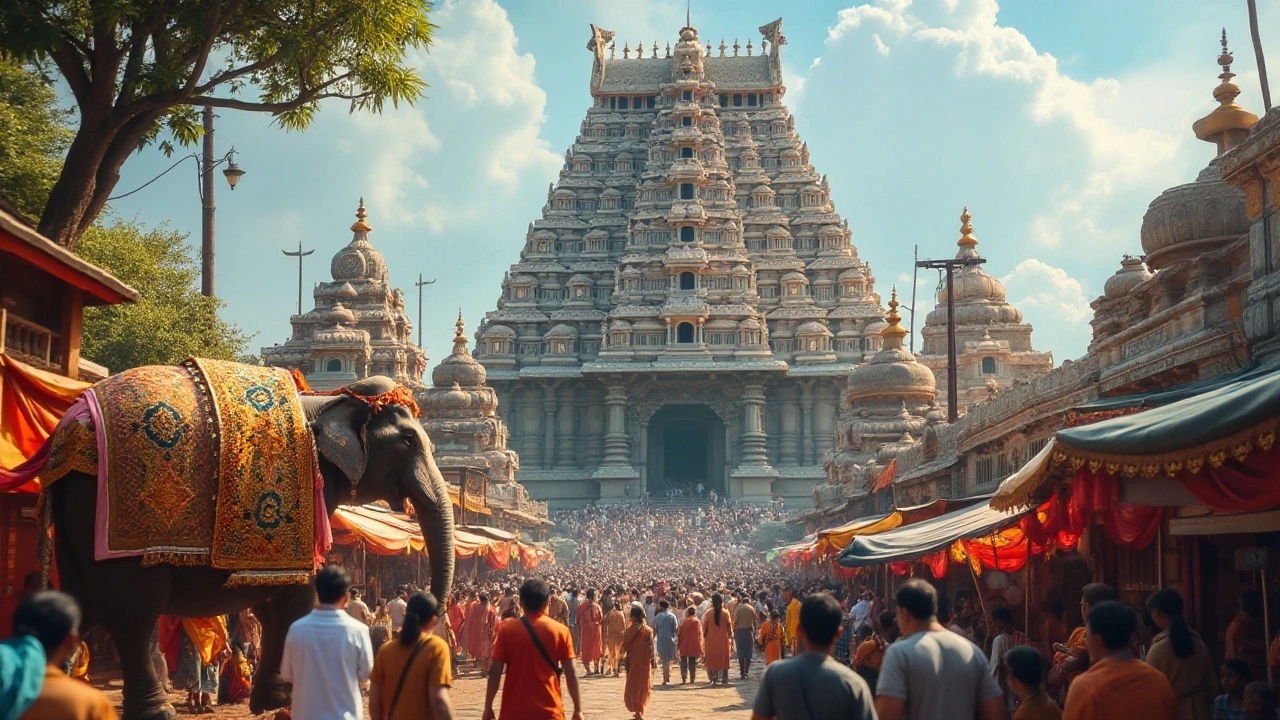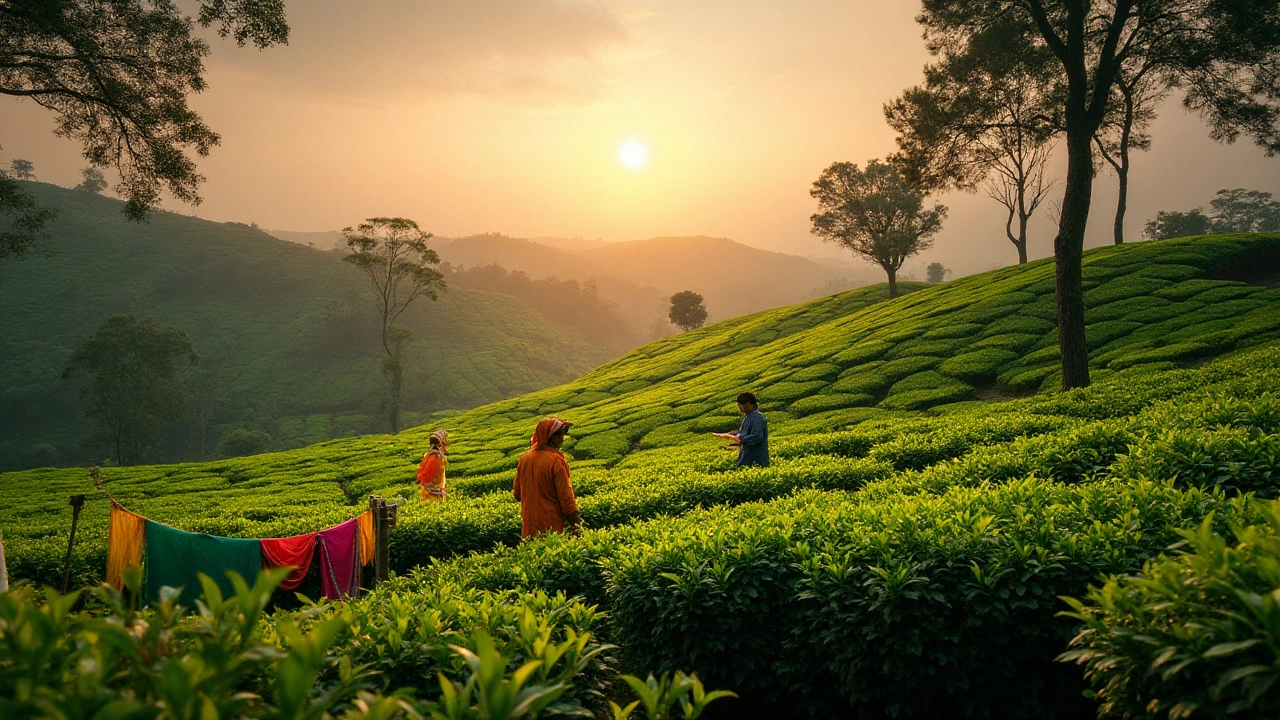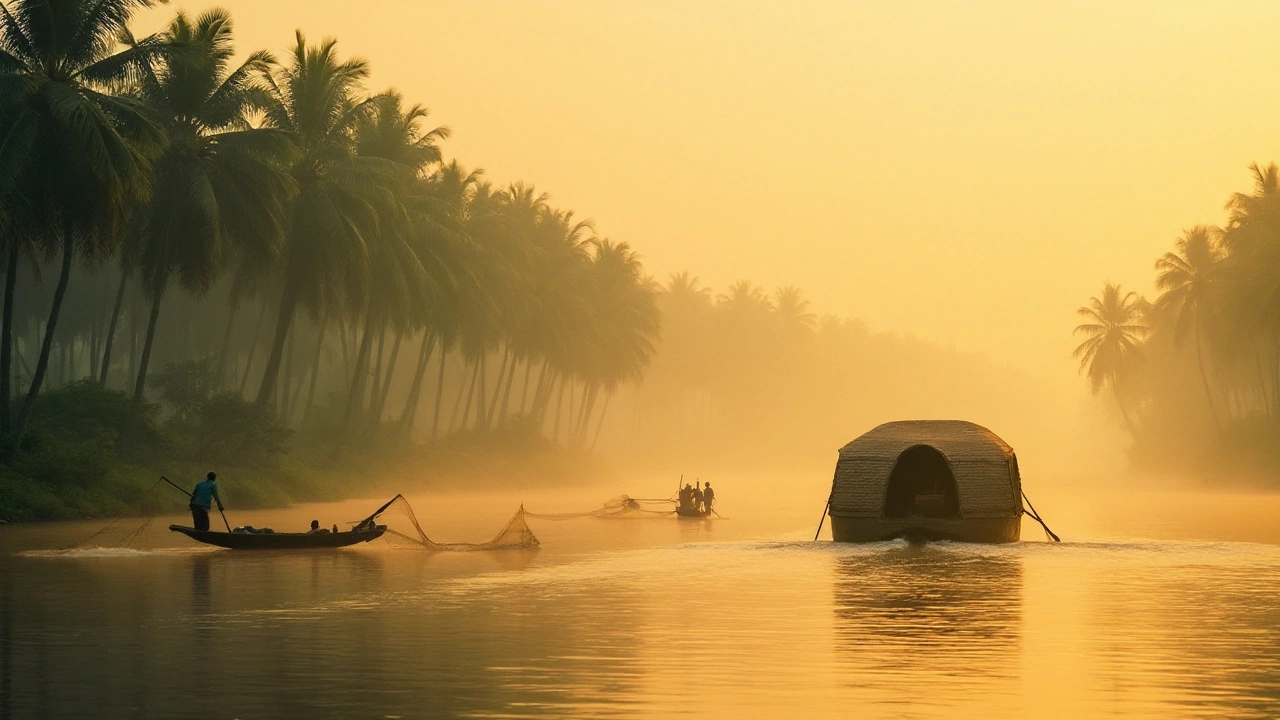Exploring South India is like opening a treasure chest of natural wonders, cultural landmarks, and adventures that invite storytelling. With lush landscapes, architectural marvels, and rich heritage to its name, every state exudes its own allure. As the travelers venture through these lands, they will be enchanted by serene beaches, have their senses catered by spicy cuisines, and feel welcomed by the vibrant festivities.
The journey starts with Kerala, fondly known as 'God's Own Country', where serene backwaters contrast against hilly retreats and bustling cities. Karnataka follows with its tapestry of history and nature, where palaces whisper secrets of the past and national parks brim with wildlife.
- The Enchanting Waterways of Kerala
- Majestic Landscapes of Karnataka
- Cultural Richness of Tamil Nadu
- Andhra Pradesh: A Cultural Mosaic
- Unique Traditions of Telangana
The Enchanting Waterways of Kerala
When it comes to experiencing ethereal beauty, the waterways of Kerala stand as a testament to nature's artistry. Known for its labyrinthine network of rivers, lakes, and canals, Kerala is renowned for its serene backwaters. These tranquil water bodies gently course through emerald green landscapes, dotted with quaint villages and swaying palm trees. The soothing rhythm of the water, combined with the rich soundscape of chirping birds and rustling leaves, offers a surreal escape from the hustle and bustle of daily life. Taking a traditional houseboat, or 'kettuvallam', through these backwaters is not only a travel highlight but a soul-stirring experience, providing a gliding platform to appreciate the stunning surroundings at a leisurely pace.
The backwaters of Kerala stretch approximately 900 kilometers, offering myriad routes to explore. One of the most popular circuits is the Alappuzha (Alleppey) to Kumarakom route, often dubbed the "Venice of the East" for its interconnected lagoons and picturesque beauty. This region is famous for its annual Nehru Trophy Snake Boat Race, an exhilarating event that showcases the community spirit and lively culture of Kerala. Imagine long, sleek boats propelled by over a hundred oarsmen, racing to the beat of traditional songs—it’s a sight to behold and an example of the vibrant cultural tapestry that South India proudly maintains.
A noteworthy aspect of Kerala's backwaters is their symbiotic relationship with life in the state. The backwaters are integral to the everyday life of many local communities who have lived harmoniously with this aquatic environment for centuries. Their livelihoods are deeply reliant on the resources provided by these waters, whether through fishing, coir production, or agriculture. One intriguing facet is the paddy farming carried out in the Kuttanad region, often referred to as the 'Rice Bowl of Kerala'. It’s a remarkable feat of engineering and perseverance, as fields lie below sea level and are interspersed with intricate waterways.
Beyond the captivating views and cultural encounters, the ecological significance of these inland waters cannot be overstated. The backwaters support a diverse ecosystem, housing several unique species of flora and fauna. The Vembanad Lake is especially notable, being a part of an ecosystem that serves as a haven for migratory birds and is recognized as a Ramsar site of international importance. Conservation efforts in this area serve as a reminder of the delicate balance between nature and human activity.
As famously quoted by Lonely Planet, "Kerala's backwaters lure serenity-seekers from around the world with their enchanting allure and soulful calm." Such beauty demands respect and mindful tourism to ensure it can for generations to come.
The allure of Kerala is not just in its natural beauty. It is an exploration of how man and nature can coexist in harmony. When visiting the backwaters, consider staying in eco-friendly accommodations that offer authentic experiences without compromising the environment. This immersive engagement goes beyond the visual, as you taste delectable South Indian dishes made from fresh, local ingredients or learn traditional arts from the skilled craftsmen in the area. Such cultural integrations enrich the overall experience and provide greater insight into the warm hospitality and vibrant life of the region.
Majestic Landscapes of Karnataka
When discussing the landscapes of South India, it is impossible not to marvel at the sheer diversity and beauty found in the state of Karnataka. Positioned strategically between the Western Ghats and the Deccan Plateau, Karnataka offers breathtaking vistas that cater to every traveler’s whim. Whether it's the mist-covered mountains or the endless stretches of cultivated land, each scene is a visual feast. The most notable are the rolling hills of Coorg, often referred to as the 'Scotland of India', where coffee plantations thrive amidst lush greenery. As visitors wander these undulating terrains, the smell of freshly brewed coffee hangs in the air, inviting them to take a pause and immerse in serenity. Wildlife enthusiasts should not miss a trip to Nagarhole National Park, where dense forests house tigers, elephants, and myriad bird species. Remarkably, Karnataka is blessed with not just flora and fauna, but also stunning waterfalls like Jog Falls - the second highest plunge waterfall in India.
Dubbed as the 'Silicon Valley of India', Karnataka's urban landscapes are equally captivating. Bengaluru, its capital, seamlessly blends a modern cityscape with beautifully preserved parks and heritage sites. But there's more than just bustling streets and tech hubs. Head to the northern part and witness the architectural prowess of ancient empires through the sunglasses of Hampi, a UNESCO World Heritage Site. Giant boulders dot the landscape, sculpted over millions of years to create a unique topography around which centuries-old temples and structures stand as testaments to a glorious past. This place often leaves people awestruck, evoking timelessness as they walk through the ruins.
"Hampi is a place where history eloquently whispers to those ready to listen," remarked historian William Dalrymple, capturing the sentiment of many who visit.Those interested in cultural heritage should not miss the intricacies of the temples dotting the landscape, each speaking of Karnataka’s vibrant past and rich culture.
Adding to the natural allure are the many trekking trails that carve through its varied terrain. The Kumaraparvatha trek is notably challenging yet rewarding, offering panoramic views of the Pushpagiri Wildlife Sanctuary. For those seeking relaxation, Karnataka's coastline stretches out serene unsung beaches such as Gokarna, where the sun paints myriad hues as it sets into the Arabian Sea. Here, the state offers a rawness untouched by commercialization. Watersport aficionados will be delighted by the activities available, with surfing emerging as a popular choice. As you explore this beautiful south Indian state, every corner of Karnataka serves as a reminder of nature's artful composition. Paneled with striking natural beauty and riveting historical layers, it's a destination destined to stay in your heart long after the journey ends.

Cultural Richness of Tamil Nadu
The cultural tapestry of Tamil Nadu is woven with threads of ancient history, sacred traditions, and vibrant festivals. It's a state where the echoes of classical music fill the air, intricate sculptures grace centuries-old temples, and age-old dances tell stories of divine beings. At its heart lies the Tamil language, one of the world's oldest languages, serving as a treasure trove for scholars and a living entity in the everyday lives of its people. Tamil Nadu is home to the iconic Bharatanatyam, a classical dance form that embodies the grace and expressiveness of Indian culture, captivating audiences with its storytelling through gestures and expressions.
In Tamil Nadu, temples are not just places of worship but living testimony to the architectural brilliance of ancient India. The towering gopurams of the Meenakshi Amman Temple in Madurai and the Brihadeshwara Temple in Thanjavur stand as magnificent examples of Dravidian architecture. These temples are adorned with intricate carvings and sculptures depicting stories from Hindu mythology, drawing devotees and tourists alike. Festivals like Pongal and Thaipusam transform the state into a vibrant tapestry of color and music, each event rooted deeply in agrarian traditions and religious fervor. During these celebrations, the harmonious blend of tradition and community spirit is palpable, demonstrating Tamil Nadu's unique capacity to embrace modernity while holding firm to its cultural roots.
The cuisine of Tamil Nadu is a sensory delight, renowned for its rich flavors and use of aromatic spices. From the tangy sambar to the crispy dosas, every meal is a feast for the senses. Food is central to Tamil Nadu’s cultural identity, with rice being a staple of the Tamilian diet, lovingly transformed into a myriad of dishes that showcase the diversity of the state's culinary heritage. A walk through the bustling markets reveals a world of flavors waiting to be discovered - from freshly harvested produce to the aromatic spices that define Tamil cuisine. This gastronomic experience is a journey of taste and tradition, echoing the diverse landscapes and communities that make up this vibrant region.
The state's rich literary tradition continues to flourish, with poets like Subramania Bharati and Thiruvalluvar influencing generations with their profound works. Literature here is not confined to the past; contemporary authors continue to weave narratives that resonate with modern readers, exploring themes of identity, change, and resilience. Thirukkural, an ancient text by the sage Thiruvalluvar, remains a beacon of wisdom, celebrated for its timeless insights into ethics and governance. Literature festivals are a common occurrence, bringing together storytellers and bibliophiles who revel in the magical world of words and expression.
Moreover, the artisanal crafts of Tamil Nadu are a delight to behold. From the world-famous Kanchipuram silk sarees to the delicate Tanjore paintings, the state's artisans preserve techniques passed down through generations. Every creation is a testament to the skill and dedication of the craftsmen, offering visitors the chance to own a piece of Tamil Nadu's cultural heritage. The tradition of craftsmanship extends to the intricate work of stone carving and bronze casting, where skilled hands breathe life into metal and stone, creating art that is both functional and beautiful. This artistic heritage is not only a source of pride for the people of Tamil Nadu but also offers travelers a glimpse into the depth and diversity of the region's culture.
Andhra Pradesh: A Cultural Mosaic
Andhra Pradesh stands as a vivid tapestry of traditions and innovations, where ancient legacies blend seamlessly with contemporary culture. This state, often described as a cultural mosaic, invites travelers to unearth the multitude of stories etched in its temples, the melodies sung in its music, and the artistry seen in its crafts. The state's rich heritage runs deep, with roots stretching back to the time when dynasties like the Satavahanas and the Kakatiyas ruled the land, leaving behind monumental architecture and art forms that still captivate the world.
A visit to Andhra Pradesh is incomplete without experiencing the grandeur of its historic sites. The Tirupati temple, nestled in the verdant hills, is a spiritual magnet drawing millions who seek divine blessings. Not far away, the majestic caves of Borra, formed through millennia of geological activity, lure adventurers and geologists alike with their intricate stalactite and stalagmite formations. These ancient natural wonders, coupled with the vibrant urban life of cities like Visakhapatnam and Amaravati, create a perfect harmony of past and present.
The lush landscape of Andhra Pradesh is rivaled only by its gastronomic delights. As the birthplace of the spicy, finger-licking Andhra cuisine, it tempts taste buds with tangy pulihora, peppery gongura pachadi, and aromatic Hyderabadi biryani. Each dish tells a story, infusing local spices with the essence of the region's coastal bounty. Many culinary enthusiasts and chefs regard Andhra Pradesh as an essential stop on their food exploration journey, drawn by the diversity and depth of flavors it offers.
One cannot overlook the intense fervor during festival seasons when the streets of Andhra Pradesh burst into life with a riot of colors and sounds. Celebrations like Ugadi and Sankranti bear witness to the communal harmony, with joyous processions and age-old rituals performed with fervor. It's during these times that the cultural threads of Andhra's society are most visible, weaving a rich tapestry of unity and diversity. Be it the folk dances that depict local folklore or the classical Kuchipudi performances, the cultural landscape is as vibrant as the traditions it upholds.
Dr. Kalpana Saroja, a renowned historian, once remarked, “Andhra Pradesh is not just a region; it is a living canvas of human achievement and natural wonders, painting an ever-changing picture with its evolving diversity.” This sentiment captures the essence of the state's identity, continually evolving yet eternally rooted in its heritage.
For those planning to explore this enchanting state, it's essential to carry a sense of curiosity and a spirit of adventure. Whether drawn to its historical sites, tempted by its culinary adventures, or eager to witness its cultural festivities, Andhra Pradesh offers a rich tapestry of experiences waiting to be discovered.

Unique Traditions of Telangana
Telangana, the youngest state of India, carved out its identity in the rich tapestry of South Indian culture. This land is a vibrant confluence of tradition, history, and innovation, housing a community that stands rooted in unity yet diverse. Known for its signature festivals, Telangana embraces a year's calendar marked with grand celebrations, the most notable being 'Bathukamma'. A floral festival that venerates womanhood, it involves women crafting exquisite floral arrangements. Dancing around these traditional stacks, they sing songs that echo with stories of olden times, creating a mesmerizing spectacle that bridges the gap between past and present.
Another remarkable aspect of Telangana's traditional life is the 'Bonalu' festival. Dedicated to goddess Mahakali, villagers offer meals to the deity as part of age-old rituals, believing in her power to safeguard them from evil and diseases. The festival epitomizes the spirit of Telangana, where devotion transcends mundane life. As per a famous quote by the historian Hariharan,
"The vibrance of Telangana's festivals paints not just its culture, but its collective soul."Adding numerical facts, it is said that over 80% of households in rural Telangana partake in these celebrations, showcasing profound community spirit.
The dialects and languages too form an integral piece in the cultural mosaic of Telangana. While Telugu remains predominant, Urdu coexists, reflecting the Nizam's legacy. Wander through the state's historic lanes, and you'll find architectural marvels narrating stories of its ruling dynasties, who amalgamated Persian influences with indigenous styles. Charminar and Golconda Fort are not mere tourist attractions, but symbols of diligence and architectural prowess. Clothing in Telangana, from the colorful saris in Pochampally to intricate pearls in Hyderabad signify a blend of elegance and craftsmanship. Walking through these bazaars feels like history coming alive, resonating with the rhythm of constituent crafts and traditional lifestyles.
Another crucial element underscoring Telangana's traditions is its cuisine. Much like its neighboring states, it promises a feast for the senses with spicy and tangy flavors that leave an indelible mark. Staples like 'Biryani' and 'Haleem', with their deep-rooted ancestry and rich aroma, are more than just dishes, they narrate stories - stories of trade, migration, and cultural amalgamations enriching the South India travel experience.
